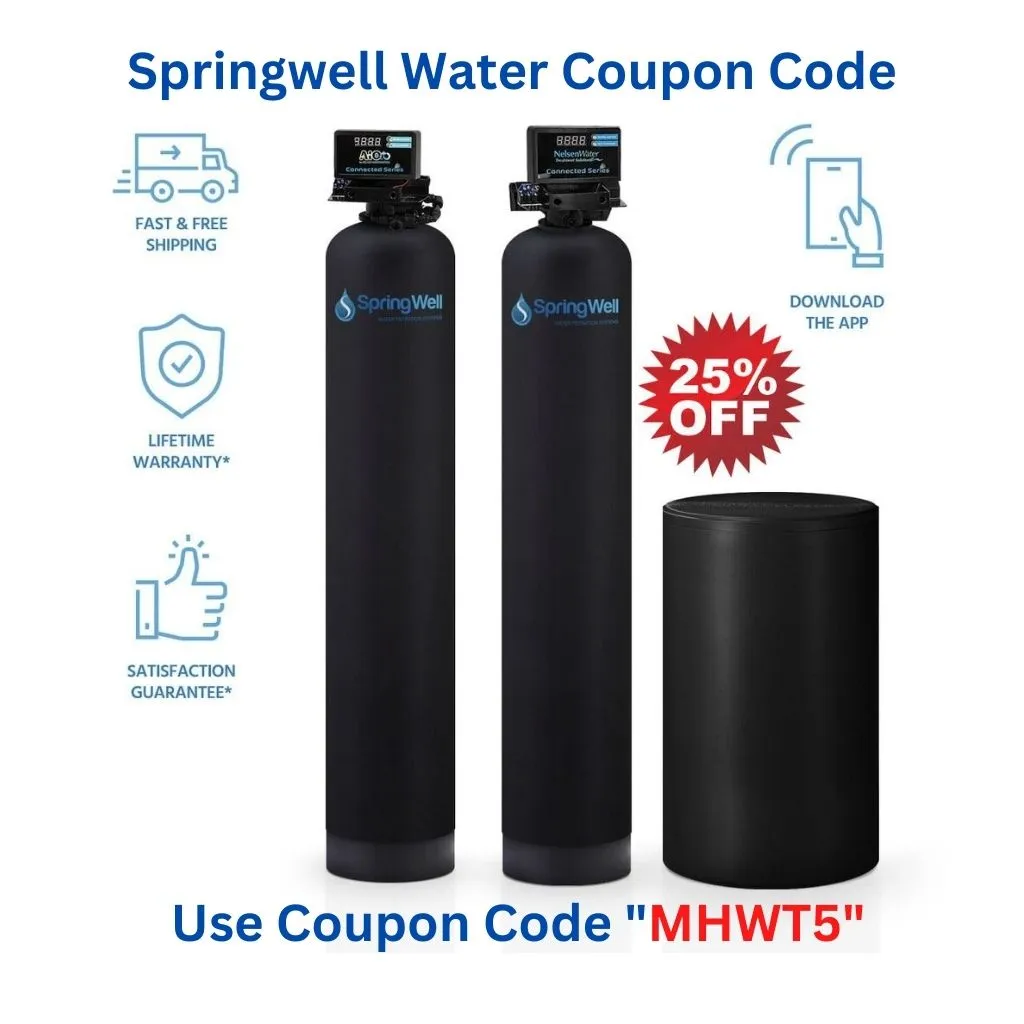Is your tap water leaving you with dry skin, stained fixtures, and clogged appliances? Discover how the best water softener for well water with iron can revolutionize your home’s tap water quality. Say goodbye to hard minerals and hello to smooth, clean, and refreshing H2O that’s gentle on your skin and plumbing system.

Content
Benefits of Using a Water Softener
Reduces Mineral Buildup in Plumbing Systems
Hard water can wreak havoc on your plumbing system, leading to costly repairs and decreased efficiency. But fear not! The best water softener for well water with iron comes to the rescue by preventing limescale buildup in your pipes.
Limescale, that stubborn white residue you see on faucets and showerheads, is caused by the accumulation of minerals present in hard water. By using a water softener, these minerals are removed before they have a chance to settle and cause damage.
Protects Appliances
Your appliances deserve some love too! Hard water can be harsh on washing machines, dishwashers, coffee makers, and other household appliances. But worry not—softened water has got you covered.
By installing the best water softener for well water with iron, you shield your beloved appliances from clogging, scaling, and corrosion caused by mineral deposits over time.
Smooth & Silky Skin & Hair
Say hello to healthier-looking skin and hair thanks to softened tap water! Hard minerals found in untreated tap water often leave our skin feeling dry and our hair looking dull.
But when you switch to using a quality water softener specifically designed for well-water with iron issues, you’ll notice an immediate difference: softer skin that retains moisture better and luscious locks that regain their natural shine.
Removing Harmful Minerals
Water is essential for our well-being, but what if it contains harmful minerals? Don’t worry! A water softener can come to the rescue by eliminating these unwanted substances and ensuring your tap water is safe to consume.
Eliminating Chlorine
Chlorine is commonly used as a disinfectant in municipal water treatment plants. While it serves its purpose in killing bacteria and viruses, it can leave an unpleasant taste and odor in your tap water.
By using a quality water softener, you can bid farewell to that chlorine flavor that might make drinking tap water less enjoyable. These devices effectively remove chlorine from the incoming water supply, leaving you with fresher-tasting and odor-free H2O.
Reducing Heavy Metals
Heavy metals like lead or copper are often present in trace amounts within untreated tap water. While small quantities may not pose an immediate threat, long-term exposure to these heavy metals can have adverse health effects.
Water softeners play a crucial role in reducing the presence of heavy metals by utilizing processes such as ion exchange or filtration. These methods help capture and eliminate these harmful substances before they reach your glass.
Installation & Maintenance Tips
Installing and maintaining a water softener is essential to ensure its optimal performance and longevity. Let’s explore some general guidelines for installation and valuable tips for routine maintenance.
Installation Guidelines
When it comes to installing a water softener, you have two options: DIY or professional assistance. If you’re confident in your plumbing skills, a DIY installation can be cost-effective. However, if you’re unsure about the process or lack experience, it’s best to consult professionals.
Before starting the installation process, gather all necessary tools and materials as per the manufacturer’s instructions. Ensure that the chosen location is suitable for your softener system—preferably near the main water supply line.
Remember to shut off the main water supply before connecting pipes and fittings securely. Follow step-by-step instructions provided by the manufacturer carefully during assembly. Once installed, check for any leaks before turning on the water supply again.
Maintenance Tips
Regular maintenance plays a crucial role in extending the lifespan of your water softener while ensuring its efficiency. Here are some helpful tips:
- Check Salt Levels: For salt-based systems, monitor salt levels regularly and replenish when needed according to your unit’s specifications.
- Clean Brine Tank: Clean brine tanks periodically to remove any sediment buildup or debris that may impair performance.
- Inspect Resin Bed: Examine resin beds annually for signs of fouling or degradation; clean them if necessary following manufacturer guidelines.
- Test Water Hardness: Test your tapwater periodically using test kits available at hardware stores or through professional testing services.
- Schedule Servicing: Consider scheduling regular servicing with experienced technicians who can inspect components, perform necessary adjustments, and address any potential issues proactively.
Conclusion
In conclusion, investing in the best water softener for well water with iron can transform the quality of your tap water. By removing minerals, reducing chlorine, and protecting your plumbing system and appliances, a water softener ensures clean, refreshing H2O that’s gentle on your skin and tastes great. Say goodbye to hard water woes and enjoy the benefits of softened tap water today!
FAQs
How does a water softener improve the quality of tap water?
A water softener improves tap water quality by removing minerals that cause hardness, such as calcium and magnesium. This helps reduce limescale buildup, enhances taste and odor, and prevents damage to plumbing systems and appliances.
Can a water softener eliminate chlorine from tap water?
No, a standard water softener primarily focuses on removing hardness-causing minerals rather than eliminating chlorine. To remove chlorine from tap water, you may need an additional filtration system or consider using activated carbon filters.
Will a water softener affect the pH level of my tap water?
Yes, installing a water softener can slightly increase the pH level of your tap water due to the removal of acidic minerals like calcium and magnesium. However, the impact is usually minimal and doesn’t significantly alter overall pH levels.

Cathy Webb is a health blog author who has been writing about healthy living since 2024. She started her journey by adopting a vegan diet and eating only organic foods, but the more she learned, the more she realized that we should all be eating plant-based diets exclusively. As an expert in nutrition and wellness, Cathy blogs to educate readers on how they can live happier and healthier lives through food choices!

